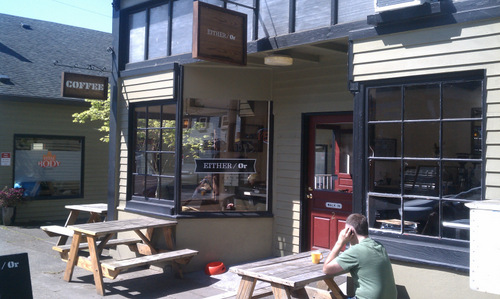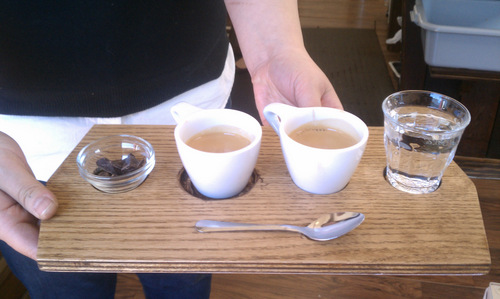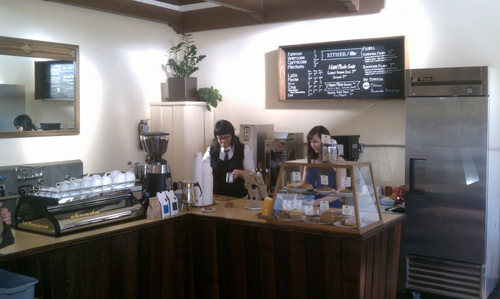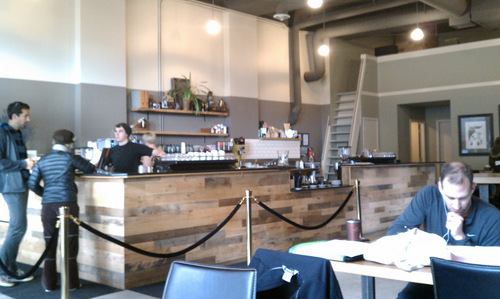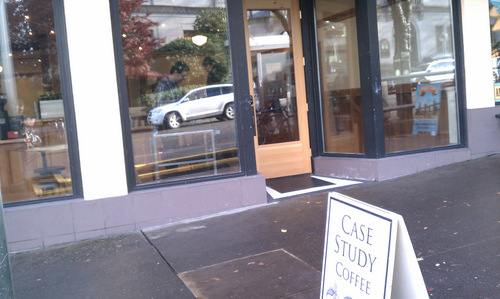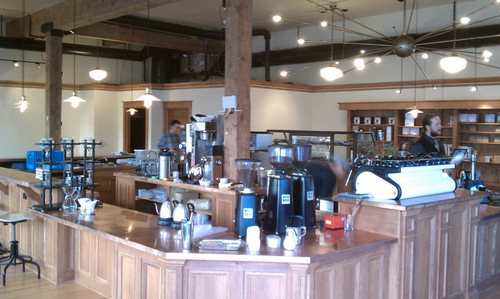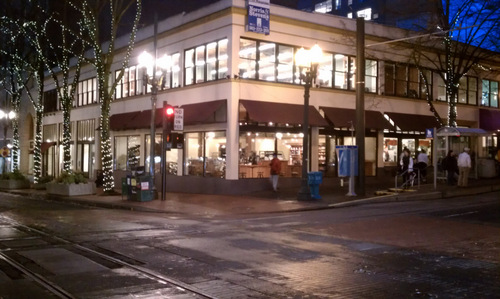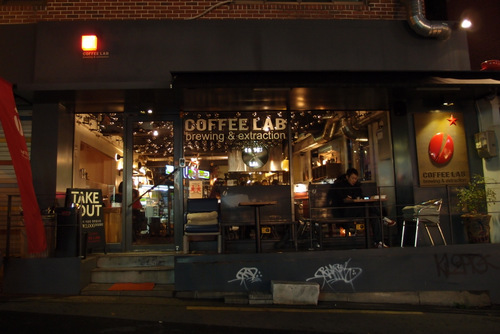[This is another in a series of articles about Seoul and its coffee scene. The trip took place in early November, and I’m posting my recollections as I finish them.]
Squeezed in between a mobile phone store and a small office building, it would be easy to walk past Café I Do without even noticing the café. The oversight would be your loss, however, because the café is one of the most inviting in Seoul.
On a chilly November afternoon, Jinsu and I ambled up the old wooden porch at Café I Do, in Seoul’s Hongdae District. We stepped into the shop and took a look around. At the front of the café, a narrow passage separated the coffee bar on the left from the sample roaster on the right. The floorboards creaked with each step as we made our way to a small table in the back of the shop.
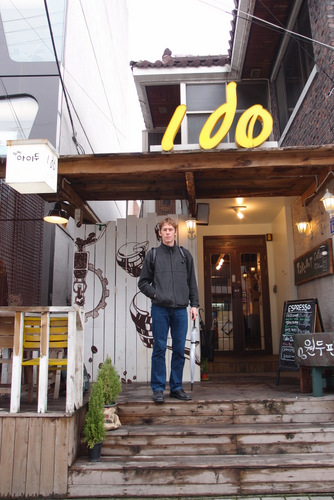 Cafe I Do. Photo courtesy JInsu Lee
Cafe I Do. Photo courtesy JInsu Lee
“What do you think?” Jinsu asked, gesturing at the décor.
I looked around. The shop felt familiar, homey. Electric heaters rotated slowly back and forth, keeping frosty drafts from outside at bay and providing a welcome refuge for my cold hands and tired feet. An array of photos and knickknacks were spread throughout the café. It was the type of place that might remind you of sitting in your grandmother’s kitchen while sipping cocoa and eating popcorn as snow falls outside.
“I like it,” I replied. “It’s so….cozy.”
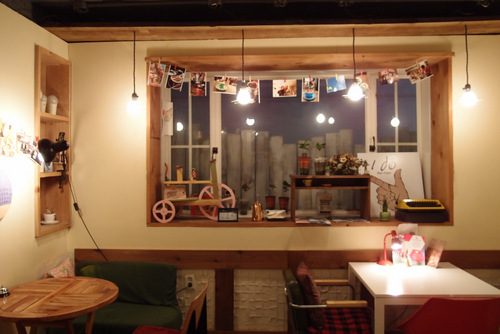 Photo courtesy JInsu Lee
Photo courtesy JInsu Lee
Jackie Chang, a well-known competitor in Seoul’s barista competitions, founded the shop in 2010 with a couple of his friends. Chang was not at the shop the afternoon we were there, but one of his co-founders (and head barista), who goes by the name of Spike, was.
Spike sat down with us to tell us his own coffee story, a story that begins far from Seoul. Spike studied hotel management in Switzerland, and as part of his education, he worked at a hotel in Italy, where his co-workers introduced him to espresso.
“When I got a cold,” he explained, “my Italian friends gave me coffee. ‘Drink this, you’ll feel better,’ they said.”
Leaving Italy, Spike returned to Korea to fulfill his mandatory two-year Korean military service requirement. When that was finished, he was ready for something new.
“I didn’t want to learn more hotel management. I wanted to find something that I really wanted to do,” he said.
He tried several different jobs, eventually ending up as a barista in another café. Coffee soon caught his attention.
“I got the passion six months later,” he said.
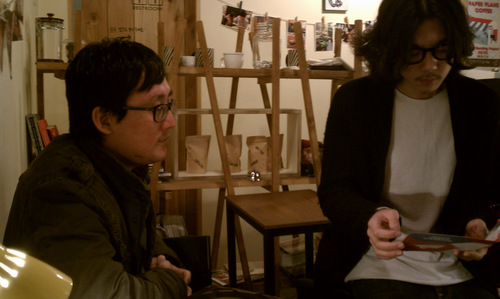 Jinsu and Spike, talking coffee
Jinsu and Spike, talking coffee
Spike liked that he had more influence over the quality of coffee, compared to wine.
“With wine, I could choose certain ones for people. This one’s better than that one, or this one goes with that meal. But with coffee, I could actually make different tastes and aromas for customers. That’s really interesting for me. That’s why I want to make coffee and be a barista.”
Spike credited Chang, for fueling his desire to learn more about coffee.
“Our owner, Jackie Chang, taught me how to taste espresso,” said Spike. “He’s a real barista. He just loves coffee. He’s not in it for the money.”
Spike was confident that Café I Do could stand out in Seoul’s crowded coffee industry.
“All our customers know we’re different,” he said. “They know that at the chains, the employees have no skills as baristas. They go to those places because the coffee is really cheap. When they want something that tastes different, they go to a smaller shop. Our customers know that.”
Getting customers excited about the coffee is a big step for growing the specialty coffee scene. Seoul’s coffee drinkers display an curiosity about coffee that bodes well for the future of the specialty industry.
“Every day we have to change the beans in the blends because the beans change every year,” he said. “All the customers ask me, ‘today’s blend, what’s in it?’ They really like to talk about it with the barista.”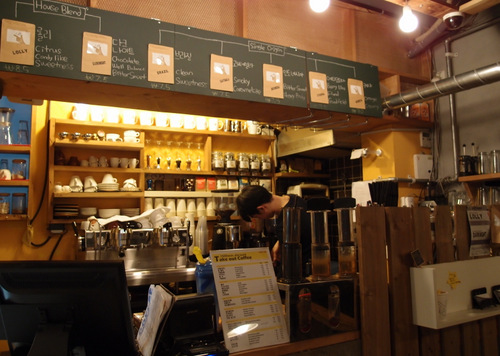 Where the magic happens. Photo courtesy Jinsu Lee
Where the magic happens. Photo courtesy Jinsu Lee
Café I Do has two different blends, one for straight shots and one for milk drinks. The shop does not serve single-origin espresso shots, though they do offer several single-origin drip coffees. The café’s AeroPress bar indulges customers who want to emphasize the brightness in the coffees.
“These days, Korean customers and baristas really like acidity in their coffee,” Spike said.
My espresso was sweet and light-bodied, well-balanced with a strong chocolate aftertaste. Jinsu enjoyed his mocha, though he would have preferred dark chocolate. Knowing we had further coffee stops ahead, we held off trying the AeroPress coffee.
Café I Do is not as slick or polished as some shops, which is one of the reasons I liked it. Of all the cafés we visited in Seoul, it seemed like the one that would most likely be found in Southeast Portland. On a rainy day, Café I Do would be an ideal spot to hide with a novel or a notebook.
Vitals
Address: 1F, 410-10, Hapjeong-dong, Mapo-gu, Seoul, South Korea (map)
Subway stop: Hapjeong (Line 2 or 6), Exit 6, or Sangsu (Line 6), Exit 1
Hours: Monday-Sunday 12pm-12am
Wi-Fi? Yes
Recommendations? Bring poetry or your best friend
Website: cafeido.com
 Monday, July 29, 2013 at 1:51PM
Monday, July 29, 2013 at 1:51PM 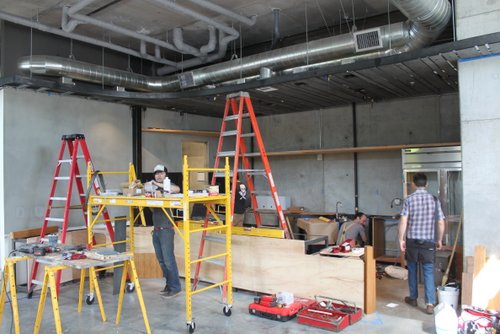 The view from the front door
The view from the front door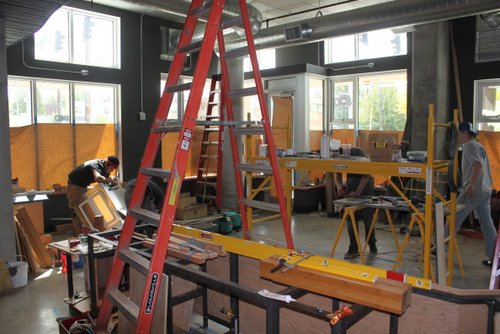 And from behind the bar
And from behind the bar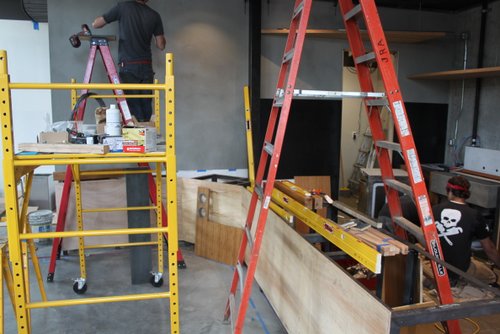 The Steampunk is headed for the spot on the bar framed by the scaffolding and the ladder
The Steampunk is headed for the spot on the bar framed by the scaffolding and the ladder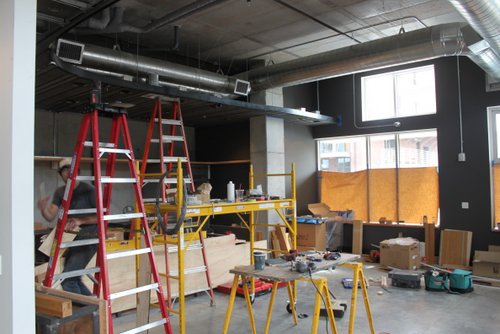 One last perspective
One last perspective


